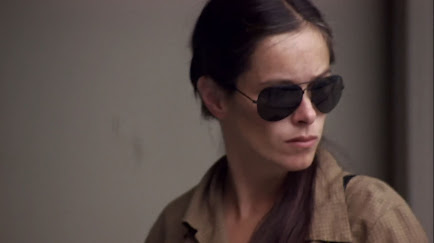From a screenplay by Ruth Gordon adapted from her
autobiographical 1946 Broadway play Years Ago (which was itself based on
her serialized memoirs Look in your Glass,
published in several issues of The Atlantic Monthly in 1939), The Actress is set in 1913 Wollaston, Massachusetts,
and chronicles, in episodic fashion, her teen years when first bitten by the
acting bug. The featherlight project first caught the interest of two-time
Oscar-winner Spencer Tracy—then the darling of MGM
and well into the “professional father” years of his career (Father of the Bride, Father’s Little Dividend) accounting perhaps
for this charming film feeling somewhat dominated by his portrayal of Gordon's stern but loving Dad. The paternal emphasis makes this movie more of a I Remember Papa sentimental memory play reverie
than a contemplation on a young girl’s determination to embark on a life on the
stage.
 |
| Jean Simmons as Ruth Gordon Jones |
 |
| Spencer Tracy as Clinton Jones |
 |
| Teresa Wright (given not a single closeup in the entire film) as Annie Jones |
 |
| Anthony Perkins (making his film debut) as Fred Whitmarsh |
When heretofore aimless 17-year-old Ruth Jones (Simmons) sees
actress and former Ziegfeld Follies star Hazel Dawn on stage in “The Pink Lady,”
she undergoes an epiphany: she MUST hereafter devote her life to becoming an
actress.
Ruth freely shares her newfound ambition with her practical
and empathetic mother (Wright), but due to his having a “disposition,” works
hard to keep her aspirations a secret from her bearish father (Tracy), a former
adventuring seaman currently bristling at the penurious state of his current
life as a factory worker.
Ruth's mother hopes for nothing more than for her daughter to settle down after graduation and marry her somewhat inattentive beau, Fred (Anthony Perkins), a handsome and genial Harvard student. Ruth's father, who paradoxically believes
women should be independent and learn to earn their own keep (he forbids his
wife from lightening their financial load by taking in sewing), has set his sights
on Ruth becoming a physical education teacher.
Meanwhile, Ruth pursues her acting dream, albeit largely through
daydreams and acting-out fantasies, until the day a well-placed fan letter to her idol Hazel Dawn
occasions a much-coveted meeting with the Great Lady (offscreen) and a summons
to Boston to meet with the director of the company. Ruth Gordon Jones’ dream of
life as an actress is set! Or is it?
Since there is never any doubt that timorous
Jean Simmons will grow up to be a Tony Award nominated stage actress, a
novelist, a playwright, an Oscar nominated screenwriter (with her husband
Garson Kanin), and win an Academy Award for Rosemary’sBaby; the only dramatic conflict The
Actress has to offer are comedic slice-of-life vignettes highlighting the
domestic uproar in the Jones household born of Ruth’s decision to pursue a life in the wicked theater.
Indeed, the film’s slightness of plot and episodic nature proved a near-insurmountable obstacle for MGM's marketing department (as with the studio's Meet Me in St. Louis, not much really happens in the way of plot). The film certainly features one of Spencer Tracy’s finest performances, but there's no getting past the fact that he's not exactly the central character, despite posters and ads prominently featuring his likeness next to the film's title.
 |
| Instead of studying, Ruth and her girlfriends engage in an impromptu performance of Hazel Dawn's signature song "Beautiful Lady" |
Reflecting this dilemma is the fact that The Actress (a title few were happy
with) entertained several working titles from pre-production through preview
screenings, the blunt and misleading Father
and the Actress proving too reminiscent of Tracy’s Father of the Bride series, but at least reflecting the film’s proper
character emphasis.
Although Jean Simmons cites it as one of her favorite films
and Spencer Tracy won a Golden Globe for his performance (and a BAFTA
nomination, to boot), favorable critical reception couldn’t save The Actress from fizzling at the box-office. In the book You Ain’t Heard Nothin’ Yet: Interviews with
Stars from Hollywood’s Golden Era, Simmons recalls going to see the film at
a theater in Westwood and being the only person in attendance.
I first came across The
Actress about five years ago when it was screened on cable. I had never even heard of
the film before, but found myself instantly charmed by its simple structure and how delightfully it captured the feeling of old-fashioned mores and attitudes. In its gentle humor and nicely-drawn characters, it
reminded me a great deal of the aforementioned Meet Me in St. Louis (1944), as well as The Happy Time (1952) and The Matchmaker (1957)—the latter being the play for which Ruth Gordon won her
sole Tony Award nomination--the film adaptation affording Anthony Perkins another
opportunity to mine, in a similar role, his likable, boyish appeal.
For all the talent in evidence both in front of and behind
the camera (personal favorite Teresa Wright is a tad underutilized, but wonderful as always), it's still Spencer Tracy who emerges as the film's most valuable player. The effortless naturalism he brings to the role, the kind which earned him the reputation as “the actor’s actor,” serves to ground his
blustering but principled character (and with it, Cukor's entire frothy enterprise)
in a realism that is as engagingly funny as it is affecting.
 |
| Clinton's most treasured possession is the spyglass he purchased during his time as a sailor |
WHAT I LOVE ABOUT THIS FILM
The lack of a propulsive plotline seems to have been a major
point of preproduction contention when it came to bringing The Actress to the screen, but for me, the small scale and intimate presentation of
this character-driven comedy feels wholly appropriate to the subject matter.
The simple, even drab surroundings and humdrum family concerns of budgeting, homework,
school dances, pay bonuses, and housecats attracted to Boston ferns provide a fitting contrast, offsetting the grandiose, larger-than-life theatricality of Ruth and her dreams.
 |
| Ruth's dreamy dissatisfaction with the confining contentment of the life her parents have chosen for themselves is the source of a lot of household tension |
The small scale of the family’s domestic dramas and the workaday
concerns of a small-town life are grist to Ruth’s desire for a better, more
exciting life. When I watch Meet Me In
St. Louis, the loving home depicted is one so enchanting, I can’t imagine
anyone ever wanting to stray from it. But the home life depicted in The Actress, while every bit as loving, also
contains an air of confinement and shared dissatisfaction. Clinton bemoans the overarching oppression
of poverty and speaks of his past as a sailor as though it were the happiest
time in his life. Annie, as much a housewife out of choice (love) as convention, is happy in her life, but her expressed
longing for a velvet dress and suppressed desire to help with the family's fiances by plying her skill as a seamstress suggest there exist broader
interests for her character than those of just home and family.
It's to the film's credit that The Actress doesn't criticize those who find happiness in a quiet life of simple pleasures, nor does it make Ruth into a figure of derision because her dreams go so far beyond the scope of what we are shown to be her then-minimal talent. Rather, The Actress is structured as a coming-of-age story with Ruth’s desire for something more out of life is depicted as just one manifestation of the natural, keenly-felt human
quest for independence and personal fulfillment. Certainly something women were not encouraged to do in those days. (What am I saying...."those days"...like it has changed all that much!)
PERFORMANCES
If you’re going to mount a film more character-based than
plot-driven, it helps to cast actors capable of creating indelible, fleshed-out
personas out of sometimes slim material. The
Actress distinguishes itself in its casting, even down to the smallest bits.
The juvenile appeal of Tony Perkins is clear in this, his
first film role. What’s also clear is that after seeing his performance here, then his livelier take on the same in The Matchmaker five years later, Hitchcock’s use of him in Psycho was positively inspired.
 |
| The likability of the actors cast goes far in mitigating the fact that several roles, Anthony Perkins' moony suitor Fred Whitmarsh, for example, are a tad underdeveloped |
If Tony Perkins’ trajectory from boy-next-door to everyone’s
favorite psychopath seems swift, it’s nothing compared to Oscar winner Teresa Wright’s
swift journey from fresh-faced ingenue in 1941’s The Little Foxes to long-suffering mom. Wright was only 11 years
older than Jean Simmons when cast in The
Actress (34 to Jean’s 23) and would play Simmons’ mother again in 1969's The Happy Ending. Late in her career, when a reporter asked Wright why she stopped making movies, she replied: “I guess Jean Simmons no longer needs a
mother.”
Without calling to mind the idiosyncratic Ruth Gordon in any way at all, Jean
Simmons is really splendid in embodying the character of a stage-struck teenage girl. Called upon
to show vivacity, naiveté, rebelliousness, and ultimately, determination and maturity;
if her performance suffers at all (test audiences at the time took a decided dislike
to her), I’d say it’s perhaps because she captures the sulky self-absorption of
adolescence all too well. Gordon, the memorialist, isn’t exactly easy on her younger self, depicting her self-centered behavior and willful single-mindedness in sometimes harshly unsentimental ways. But I like that
the character has an arc of growth in the film. And if perhaps she starts out
as something of a dreamy-eyed brat, she grows into a mature woman of some empathy and
understanding of what parents sacrifice in raising spirited and independent-minded offspring.
THE STUFF OF DREAMS
Because he’s never been tops on my “favorite actors” list, I
tend to harbor the impression of Spencer Tracy as one of those solid, dependable,
studio system actors who could always be relied upon to deliver a skilled, professional
performance in any film assigned. It’s only when I actually watch one of his
films that I’m reminded what a valuable and rare quality that is.
It could be argued that nothing Tracy does as Clinton Jones is anything he hasn’t done before; after all, by this time in his career, he’d made well over 50 films. But what’s remarkable about Tracy is that he was a star with a character actor's gift for inhabiting a part so completely: the behavior, movements, and vocal inflections all seem to exist exclusively for whatever character he was portraying in a particular film.
In The Actress, his character is largely identified by an irascible demeanor and an authoritarian gruffness, but to watch Tracy stay in character while delivering a monologue that's part searing tirade against the cruel aunts who brought him up/part lamenting requiem for his mother who committed suicide when he was two years old--well, it's to watch a little bit of acting genius.
Much like my experience with the film adaptation of Thornton Wilder's The Matchmaker, I came to The Actress with low expectations. I was not only surprised by what a wonderful film it was, but I was also completely captivated by its warm humor and charm.
The film's vignette structure may play a bit of havoc with Ruth and Fred's relationship (we never understand whether it's as serious as Fred takes it to be or as casual as Ruth makes it out to be), but it nicely suits the photo album/scrapbook setup of the title sequence. The script is witty, and the performances are uniformly fine.
 |
Ruth's reaction to seeing Hazel Dawn (Kay Williams) on the stage is not unlike my response to seeing the critically lambasted 1980 musical Xanadu (of all things). Although I was attending film school at he time and had set my sights on becoming a filmmaker, something about that roller-skating muse musical so inspired me that I quit school, devoted all my time to studying jazz and ballet, and eventually made dance my career for the last 30-plus years.
Illogical, irresponsible, and highly improbable, yet it was a dream that came true.
 |
| Effort and hard work are indispensable, but having a dream is where it all begins |
I think there is much in The Actress that speaks to anyone who seeks to strike out on their own, armed with little more than impossible dreams and a (by appearances) baseless belief in self.
Clip from "The Actress" (1953)
"The Actress" opened in Los Angeles on Friday, September 25th, 1953











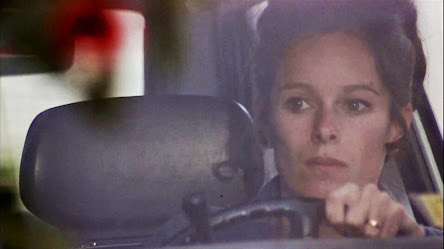

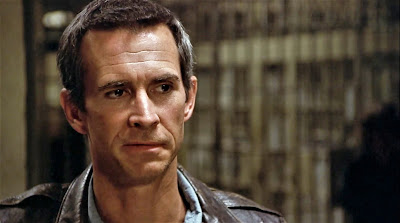

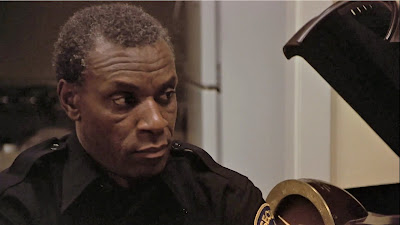


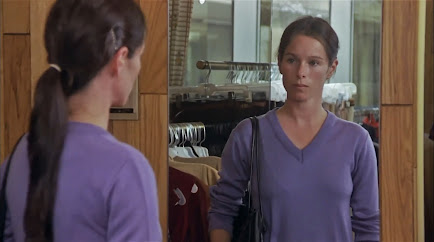

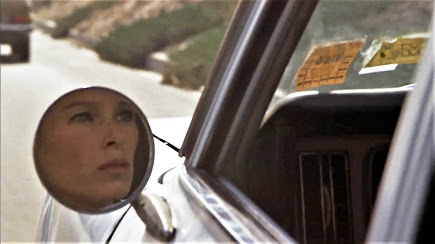
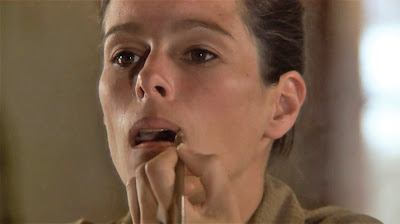






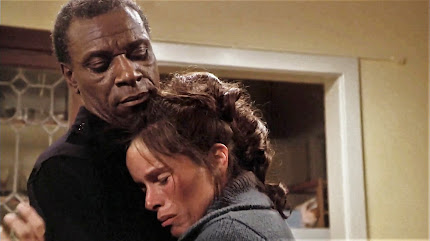

.JPG)







